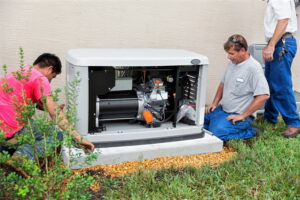We install whole-house generators in Lancaster, NY and throughout Western New York, and we’ve found that they are one of the most useful upgrades people can make to their homes. Portable generators simply don’t have the power, convenience, reliability, or safety that comes with installing a whole-house generator wired directly into a home’s electrical system. With an automatic generator, the benefits are even greater, since the generator will activate automatically when there’s a power outage.
But once a homeowner decides on getting a standby generator, the next question they have is “How powerful a generator do I need?” Let’s look into that—and remember that you can always rely on our top-notch team to help you find out the ideal generator to install for your house.
How Generator Power Is Measured
The first fact you need to know about generator power is how it’s measured. It’s not small, medium, or large! The power or “size” of a generator is measured in watts. The watts you’ll see listed on a generator are its running watts, which are different from the starting watts (a.k.a. surge watts), which are the extra watts needed for two to three seconds to start appliances that operate using motors. For the most part, you’ll concern yourself with the running watts, as the starting watts for generators are sized to be commensurate with the running watts.
The running watts of a generator can range widely. Smaller whole-house generators will have under 5,000 watts. A 10,000-watt generator is considered to be commercial or industrial in size.
What Do You Want to Power With Your Generator?
You may not necessarily need to have your entire house powered through a black out. Make a list of all the essential appliances you want to operate during a loss of power, such as the refrigerator, some of the lights, and the HVAC system. “All of them” is also a reasonable request! It depends on your household and what will help your family best through an extended power loss.
Calculate Total Wattage from Devices
This is a two-step process. First, add up all the wattage from the devices you want to run. Then find out which device has the highest starting wattage requirements, and add that to the total. This will give you a general idea of the wattage requirements, both running wattage and starting wattage.
Ballpark for the Whole House
If you’re looking to power your entire house, you’ll probably end up with a generator that’s between 5,000 and 7,500 running watts.
Consult With the Professionals
The above guidelines are all effective for getting an estimate for a generator, which will help you with getting a sense of the cost for the installation. However, you will need professional installers to help you make the final decision. They can do a more accurate assessment of your home’s electrical demands as well as factors you might overlook (seasonal conditions, your current electrical system, etc.). They’ll also make sure you don’t get a generator that’s too powerful, which can be a disaster.
Scherer Electric Is Western New York’s Favorite Electrician! Rely on us to help you find the ideal whole-house generator.






